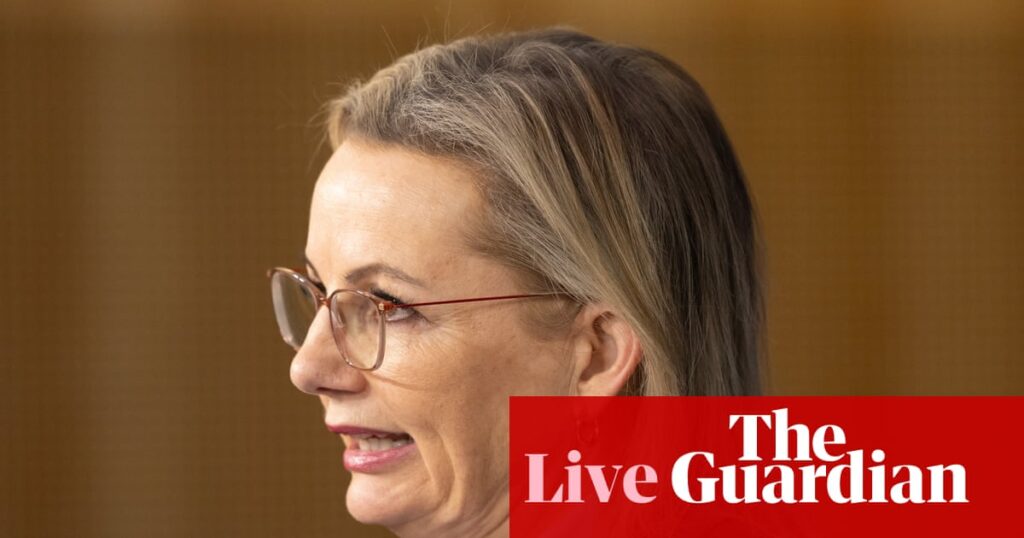Sussan Ley dodges questions about how much net zero by 2050 would cost
Sussan Ley, the opposition leader, refused to say how much it would cost to transition the economy to net zero emissions by 2050.
Ley just had a heated back and forth on RN Breakfast, where she repeatedly declined to say if the Coalition knew how much the transition would cost:
Labor doesn’t have a figure, we have a plan. And the point is that if you look at our plan, it injects more supply into the system, which pushes costs [down] if we’re arguing about cost …
I just know that the cost is blowing out under Labor, which is why the cost of your power bill is going up. Sally, have you asked the PM what the cost is? Have you got a straight answer from him? The government is in charge of all of these levers for energy policy right now. What we’re saying is: if we are fortunate enough to be elected, this is what we would do.
The Nationals leader, David Littleproud, and other Coalition MPs have regularly bandied about a $9tn figure for that transition. That claim is false, with the group behind that number saying it had been misrepresented. Academics actually found the additional cost of building an energy system to reach net zero by 2050 was closer to $300bn.
My colleague Adam Morton has more on those figures here:
Key events
Gardener charged with manslaughter after Sydney woman dies
A man was charged with manslaughter after the death of an 86-year-old woman in the inner-Sydney suburb of Glebe, following an alleged assault at her property last month.
NSW police said the man, 53, was employed as the woman’s gardener. Officers allege the man entered her home in Glebe on 31 October before assaulting her and then leaving the premises.
The woman was taken the hospital in a serious condition later that day and the man was subsequently arrested and charged with reckless grievous bodily harm and staking or intimidating to intending fear or physical harm.
Police said they were later informed the woman died on 6 November in hospital. The man was formally charged with an additional count of manslaughter on Tuesday.
He will reappear in court in January.

Cait Kelly
Victoria only state on track to meet national housing targets, report finds
A new joint report from the Summer Foundation and YIMBY Melbourne reveals that Victoria is the only state on track to meet its national housing targets while also adopting the Livable Housing Design Standard (LHDS) – a national accessibility benchmark that NSW and WA have refused to commit to.
The national housing accord aims to have Australia build 1.2m new homes from mid-2025 to mid-2029. Victoria is forecast to deliver 98% of its target of 306,000 dwellings by 2029 – the only state on track to come close to its target.
NSW, for comparison, is forecast to achieve only 65% of its target of 376,000 homes.
Joel Dignam, lead campaigner at the Summer Foundation, said:
Victoria’s success shows that when you get the settings right, accessibility and affordability can go hand-in-hand.
Delaying liveable housing standards in the name of supply is a Trojan horse for perpetuating housing discrimination. Every new home should be one that everyone can live in.
NSW is reforming its planning system — that’s promising. But it must stop using accessibility as a scapegoat and commit to the LHDS.

Caitlin Cassidy
SA’s education minister urges federal government to launch national inquiry into asbestos bungle
South Australia’s education minister will write to the federal government on Wednesday calling for an urgent national inquiry into how coloured sand products which have been contaminated with asbestos were allowed into the country.
It follows the closure of a string of schools in the ACT and Tasmania that were confirmed to have used the products, and recalls from major retailers including Target, Kmart, Woolworths and Officeworks.
A ban and import prohibition for asbestos in Australia has been in place since 2003. On Tuesday, border officials confirmed the coloured sand products were not required to undergo any testing for the hazardous material before they were imported.
The minister for education, Blair Boyer, said the recall had led to costly specialist removal and cleaning in thousands of buildings nationwide. No public schools have closed in South Australia over the asbestos concerns however two Catholic special schools were shut for cleaning.
How on earth does this happen in this day and age? It is completely unacceptable. There needs to be an urgent inquiry so we can understand how these products were allowed to be imported into Australia.
This has affected thousands of schools right across the country, let alone the countless families who may have the product in their homes. While the risk to children this time has been low, we need to make sure there are stringent regulations in place to ensure this never happens again.

Krishani Dhanji
‘This is a government that believes in science’: says industry minister on CSIRO job cuts
The government says the Commonwealth Scientific and Industrial Research Organisation (CSIRO) will go through a “process” in the coming weeks and months to ensure “all of its effort is directed towards the research priorities of the CSIRO”, in response to questions on the organisation’s announcement it will cut more than 300 jobs.
The industry minister, along with the PM, addressed the media in WA on Tuesday evening. The CSIRO announced that 300 to 350 roles are expected to be cut, in addition to job losses earlier this year and in 2024.
Minister Tim Ayres said he would support the CSIRO during this “difficult time” for the organisation.
This is a government that believes in science. We believe in investing in science. We will continue to invest in science …
I’ve watched the management and leadership of the CSIRO working through these issues with their staff. There’s still more work to do, but they have come forward with that announcement. It is obviously a difficult time for the organisation, but with prioritisation from a government that believes in our national science institution and its capacity to serve the national interest, that is a necessary process, and I support them working their way through those questions.

Jonathan Barrett
Australia’s ‘right to disconnect’ laws helping to reduce unpaid overtime
Workers are quietly exercising their right to disconnect, according to workplace experts, despite rarely lodging claims against overbearing managers.
Last financial year, the Fair Work Commission received just seven applications under the right to disconnect provisions, designed to protect workers who refuse to respond to their employer after hours.
While the small number of applications has raised questions over the reform’s effectiveness, Trent Hancock, principal at Jewell Hancock employment lawyers, says the laws are being used by employees “more as a shield than a sword”.
You’ll have employees not responding to that out of hours communication. The employer recognises that if they then issue a direction to do so, they’ll find themselves on the receiving end of an application to the commission.
The disconnect laws came into effect for all “national system employees” in August last year. Small businesses were brought under the reforms in August this year.
Fiona Macdonald, from the Australia Institute’s Centre for Future Work, says the protections have helped reduce unpaid overtime in workplaces.
Its biggest effect was always going to be about shifting the culture.
The institute’s annual “go home on time day” report found that while full-time employees have been exercising their right to disconnect, part-timers and casuals are doing more unpaid overtime.
NSW to ban Nazi chants and expand police powers after Sydney rally
People in NSW who chant Nazi slogans could be imprisoned as part of a bid to punish and unmask far-right extremists, AAP reports.
New legislation will be introduced by the NSW government on Wednesday after 60 black-clad neo-Nazis yelled Hitler youth chants at state parliament on 8 November.
Though Nazi symbols are already banned in many jurisdictions, the bill will expand the ban to behaviour that shows support for Nazi ideology through imagery or characteristics associated with the ideology.
Anyone who repeats Nazi chants will face up to a year in prison or a maximum fine of $11,000 – a punishment that could be doubled for those who do so near a synagogue, Jewish school or the Sydney Jewish Museum. Attorney general Michael Daley said:
Nobody should be subject to this vile hatred because of their background or faith. We are giving police and the courts additional powers to hold Nazi extremists to account for their abhorrent views.
Police will be able to order perpetrators to take down suspected Nazi symbols and those who refuse could be hit with a $2,200 fine or three months’ prison.
Sussan Ley dodges questions about how much net zero by 2050 would cost
Sussan Ley, the opposition leader, refused to say how much it would cost to transition the economy to net zero emissions by 2050.
Ley just had a heated back and forth on RN Breakfast, where she repeatedly declined to say if the Coalition knew how much the transition would cost:
Labor doesn’t have a figure, we have a plan. And the point is that if you look at our plan, it injects more supply into the system, which pushes costs [down] if we’re arguing about cost …
I just know that the cost is blowing out under Labor, which is why the cost of your power bill is going up. Sally, have you asked the PM what the cost is? Have you got a straight answer from him? The government is in charge of all of these levers for energy policy right now. What we’re saying is: if we are fortunate enough to be elected, this is what we would do.
The Nationals leader, David Littleproud, and other Coalition MPs have regularly bandied about a $9tn figure for that transition. That claim is false, with the group behind that number saying it had been misrepresented. Academics actually found the additional cost of building an energy system to reach net zero by 2050 was closer to $300bn.
My colleague Adam Morton has more on those figures here:
Home affairs minister adds conversations ongoing to make sure laws are ‘fit for purpose’ after neo-Nazi rally
Burke added that officials had “significant” powers under current law, but there were ongoing discussions following the neo-Nazi rally.
As you’d expect, there are conversations that I’m having with my department to make sure that all the laws that we have are fit for purpose, not only with my department, but obviously the different intelligence and law enforcement and security agencies that are within my portfolio as well.
The home affairs minister said he was always “pressure testing” different laws with Asio, the AFP and the criminal intelligence commission, adding you never get to a point where you say, “okay, laws, they’re all fixed”.
You’re always reviewing because the nature of the attack and the nature of what people want to do to our social cohesion is always changing.
‘He’s not heading back into the Australia community’, Burke says of man detained after neo-Nazi rally
Tony Burke, the minister for home affairs, said the South African man who had his visa cancelled after attending a neo-Nazi rally in Sydney is not welcome in Australia and would soon be on his way to his home country.
Burke spoke to RN Breakfast this morning, saying the decision to cancel Matthew Gruter’s visa also sent a message “to the rest of Australia about what we find acceptable”.
He went on:
He’s not heading back into the Australian community.
I think there’s a really simple concept here: that when someone’s on a visa, they’re a guest in Australia, and almost every visa holder is a very welcome guest, and they treat Australia with incredible respect. But if someone turns up as a guest in your home and they just want to create arguments, abuse people, and wreck the place, then you ask them to leave.
And this bloke, for whatever reason, has decided that he can arrive in Australia and then tell a whole lot of Australian citizens that they’re not welcome here. Well, the person who’s not welcome is him and he can leave.
Burke added that his decision was linked to the need to send a “strong national message out” that “modern Australia and multicultural Australia are the same thing”.

Jordyn Beazley
Following on from last post
Daley said in his reading of the bill that the court had acknowledged in its findings that there would be a lesser burden on this freedom if the power was narrowed so that it only affected those who are seeking to access or leave a place or worship.
He said that this was “always the New South Wales government’s intention”:
This bill proposes to clarify the move-on power to give effect to the original intention of this measure …
In doing so, the bill clearly expresses the government’s intention to protect people who are entering or exiting the place of worship.
He said the maximum penalty for refusing to comply with a police move in this instance would be $220.
The catalyst for the first version of the place of worship bill was a protest outside the Great Synagogue where a member of the Israel Defense Forces was speaking. Some Labor MPs had warned their premier, Chris Minns, in an internal meeting before the laws passed that the expanded police powers could be found constitutionally invalid.
NSW government introduces fresh laws restricting protests outside places of worship

Jordyn Beazley
The NSW government has introduced a fresh bill to restrict protests outside places of worship, with the state’s attorney general telling parliament last night that the new legislation clarifies the scope of police powers after an earlier version was found constitutionally invalid.
Michael Daley told parliament in the first reading of the bill last night that the new legislation would give police powers to issue a move-on direction to people participating in a protest taking place in or near a place of worship, but only if the conduct is harassing, intimidating or threatening a person accessing or leaving or attempting to access or leave the place of worship.
He said a person can also be moved on if police find they are intentionally blocking, impeding or hindering a person from accessing or leaving a place of worship.
Daley acknowledged the supreme court’s findings that struck down an earlier version of this law in October after it found the police powers were constitutionally invalid because it impermissibly burdened the freedom of political communication implied in Australia’s constitution.
Those laws, which were successfully challenged by the Palestine Action Group, had given police broad powers to move on someone protesting in or near a place or worship, regardless of what the protest was about.
Good morning, and welcome to Wednesday. Nick Visser here to mind the blog today. Let’s jump in.
Job market locking out those who need work the most, says Anglicare

Cait Kelly
Australia’s job market is locking out people who most need a chance to work, Anglicare Australia’s annual Jobs Availability Snapshot has revealed.
The Snapshot measures how many jobs are available for people who don’t have qualifications or recent experience.
It finds that:
-
For every entry-level vacancy, there are 39 people on the JobSeeker payment.
-
Of those, 25 have barriers to work. This is the highest ratio ever recorded by the Snapshot.
-
Entry-level jobs now make up just 11% of all vacancies. This is their lowest share in a decade.
Anglicare Australia executive director, Kasy Chambers, said:
All of this shows that people are being failed by a system that treats unemployment as a personal fault instead of a policy failure.
Taxpayers are spending billions of dollars on private employment providers whose business model depends on compliance and punishment. They profit whether or not people find work. Meanwhile, people are stuck in endless appointments and meaningless activities – all while competing for jobs that simply aren’t there.
It’s time to end this failed experiment. The for-profit model has been running for over 20 years, and long-term unemployment has only grown.

Anne Davies
Follows on from previous post
The proposed reforms to work health and safety laws clarifies the responsibility around the use of these systems and will allow union representatives to gain access to the algorithms behind the systems so they can fully understand how they are impacting workers – and take action to enforce labour standards, if required.
The amendments will place an obligation on the person legally responsible for the business to ensure these digital tools do not lead to unsafe workloads, unreasonable performance tracking, excessive surveillance or discriminatory work allocation.
The NSW minister for industrial relations, Sophie Cotsis, said.
As digital systems become more common in workplaces, the Minns Labor government is making sure that these systems help businesses without undermining the health and safety of workers. This is about protecting workers’ mental health, preventing harm before it occurs, and giving everyone confidence that workplace technology is used responsibly.
The Minns Labor government has also committed to continuing to work with other jurisdictions through the SafeWork Australia process on how digital systems can be kept safe at work.
The bill responds to relevant recommendations of a 2022 select committee on the impact of technological on the future of work in NSW (reported in 2022) regarding the rise of digital systems and their real impacts on worker psychosocial health.
NSW targets ‘dehumanising’ work systems such as Amazon’s

Anne Davies
The Minns Labor government will today introduce new laws to put guardrails around the use of digital programs designed to optimise workers’ workloads.
Digital work systems, often powered by artificial intelligence, are deployed by companies such as Amazon and Uber in retail and in logistics to devise the most efficient way to determine staffing and to pick and pack items and deliver them.
But there are growing concerns that these types of systems can become dehumanising, measuring everything from the speed at which workers work, to the time they spend going to the toilet.
Bernie Smith, the NSW secretary of the Shop Distributive and Allied Employees Association (SDA), the union that covers retail and warehousing workers, said that often these systems were purchased off the shelf from the US, where labour standards were different from those in Australia.
These systems take out every gap in a worker’s work day, but it is often the gaps that make us human and make our work bearable.
Amazon does it to the nth degree but many other workplaces are using them too. It’s not working smarter, it’s just working harder.
Optus fined over $826,000 for customers losing $39,000 after scammers compromised ID checks

Josh Taylor
Optus has paid a fine of $826,320 after its subsidiary, Coles Mobile, fell victim to scammers who were able to exploit a vulnerability in third-party ID checks used by Optus to bypass the required verification and gain control of at least four mobile accounts.
Telcos are supposed to have strong ID verification settings in place to prevent scammers from porting a number to a different telco. Scammers who successfully port numbers can then intercept the multi-factor authentication verification for banking if SMS is the method the bank uses. In this case, the scammers then used those mobile services to access the bank accounts of those customers, resulting in reported losses of $39,000.
Coles Mobile breached anti-scam rules on 44 occasions between September and October 2024, the Australian Communications and Media Authority (Acma) said.
Acma member Samantha Yorke said it was a one-off issue that was quickly fixed, but it was inexcusable for any telco to not have robust customer ID systems in place, let alone the second-largest telco in Australia.
She said:
Scammers are always looking for any weaknesses in systems, and on this occasion Optus left a vulnerability which directly exposed people to harm. This is the maximum financial penalty the Acma was able to give in this matter. It reflects the serious nature of the breaches.
Welcome
Good morning and welcome to our live news blog. I’m Martin Farrer with the best of the overnight stories before passing the news baton to Nick Visser.
Optus has been fined $826,320 after a subsidiary, Coles Mobile, was targeted by scammers who exploited a weakness in third-party ID checks and gained control of at least four mobile accounts, stealing $39,000 from bank accounts. More details shortly.
The NSW government has introduced a fresh bill to restrict protests outside places of worship, with the state’s attorney general telling parliament last night that the new legislation clarifies the scope of police powers.
It’ll be another busy day in Macquarie Street as the government introduces new laws to protect workers from digital work systems which unions says can be dehumanising, with controls on toilet breaks and the like. More coming up.

